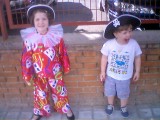cREATE

Definitions of Creativity
There are many definitions of creativity; dictionaries give the following meanings:Heritage Illustrated Dictionary:
create: To cause to exist, Bring into being, Originate, To give rise to, Bring about, Produce, To be first to portray and give character to a role or part (appropriate to creating fictional characters and writing stories) creation: An original product of human invention or imagination.creative: characterized by originality and expressiveness, imaginative
Macquarie Dictionary (an Australian dictionary)
create: to evolve from one's one thought or imagination to make by investing with new character or functions.create: author, bring into being, compose, conceive, parent, form, give rise to, throw together
creative: generative, ground-breaking, innovative, originate, handmade
Other related words re: creativity:
creativity creativeness, formativeness, innovation, inventiveness, originality, productivity, craftsmanship, authorship, creatorship"Being creative is seeing the same thing as everybody else but thinking of something different"
There are many aspects to creativity, but one definition would include the ability to take existing objects and combine them in different ways for new purposes. For example, Gutenberg took the wine press and the die/punch and produced a printing press. Thus, a simple definition of creativity is the action of combining previously uncombined elements. From art, music and invention to household chores, this is part of the nature of being creative. Another way of looking at creativity is as playing with the way things are interrelated. Creativity is the ability to generate novel and useful ideas and solutions to everyday problems and challenges.
Creativity involves the translation of our unique gifts, talents and vision into an external reality that is new and useful. We must keep in mind that creativity takes place unavoidably inside our own personal, social, and cultural boundaries.
The more we define our creativity by identifying with specific sets of values, meanings, beliefs and symbols, the more our creativity will be focused and limited; the more we define our creativity by focusing on how values, meanings, beliefs and symbols are formed, the greater the chance that our creativity will become less restricted.
In the creative process there are always two different (but interrelated) dimensions or levels of dynamics with which one can create:
- The system which may be a particular medium (e.g. oil painting or a particular musical form), or a particular process (like a problem solving agenda, or an approach to creativity like Synectics). The creative person manipulates that means to a creative end.
- The second dimension is described by the conceptual "content" which the medium describes. Again, the creative person depicts, changes, manipulates, expresses somehow the idea of that content.
There is no one definition of creativity that everyone can agree with. Creativity researchers, mostly from the field of psychology, usually claim that being creative means being novel and appropriate. Subsumed under the appropriateness criterion are qualities of fit, utility, and value.
At least three aspects of creativity have drawn much attention.
- The creative process, receiving the most attention, focuses on the mechanisms and phases involved as one partakes in a creative act.
- A second aspect of creativity is the creative person. Here, personality traits of creative people are central. The environmental atmosphere and influence are concerns of a third aspect, the creative situation.
- Lastly, the criteria or characteristics of creative products have been sought. This area is of particular importance because it is the basis of any performance assessment of real world creativity and may provide a window on the other aspects of creativity.
Briefly stated, creativity is often thought to exist on at least five levels:
- a higher level versus a lower level
- grand versus modest
- big "C" versus little c
- paradigm-shifting versus garden-variety
- eminent versus everyday
- expressive versus productive
- expressive versus inventive
- expressive versus innovative
- invention versus discovery
- theory versus invention versus discovery
- accommodative versus assimilative
- personal versus public
There are three general ways of achieving a creative solution:
- serendipity
- similarity
- and meditation
Creative thought can be divided into divergent and convergent reasoning.
- Divergent thinking is the intellectual ability to think of many original, diverse, and elaborate ideas.
- Convergent thinking: the intellectual ability to logically evaluate, critique and choose the best idea from a selection of ideas.
Both abilities are required for creative output. Divergent thinking is essential to the novelty of creative products whereas convergent thinking is fundamental to the appropriateness.
Thus, any general definition of creativity must account for the process of recognition or discovery of novel ideas and solutions.
Return to Creativity Basics
Return to Creativity Web
Last updated: 4th August 1999
1 comentario
rUGER -